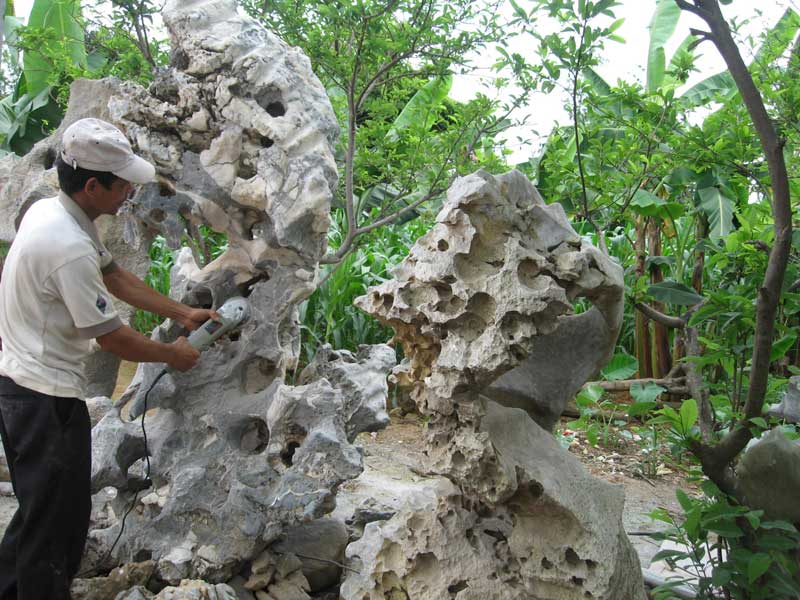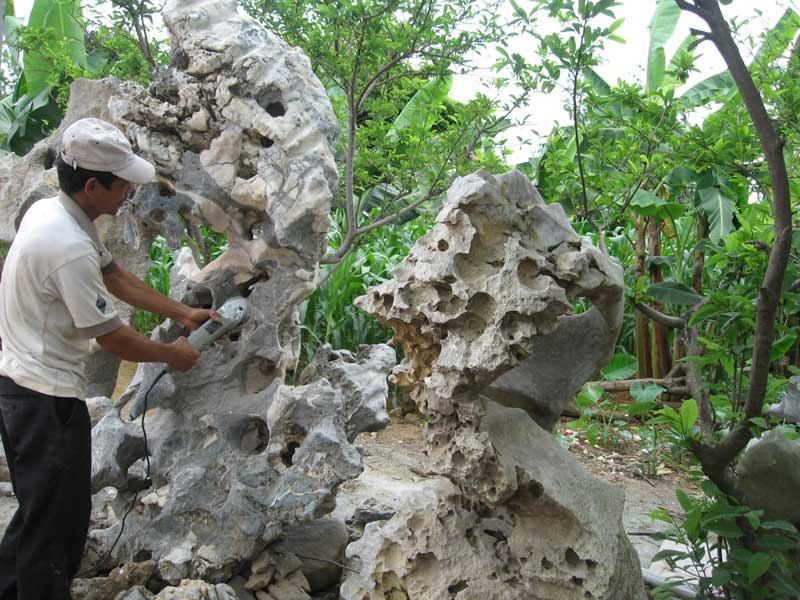
(HBO) – Local residents in Doan Ket hamlet (Lam Son commune, Luong Son district, Hoa Binh province) are excited to know that their commune has been recognised as a craft village of "go lua” (a kind of wood which is taken from the firmest core at the root of dead ancient trees) and "da canh” (ornamental stones).
Doan Ket hamlet is now home to 53 wood and stone crafting households. Their incomes are more stable than the nearly 100 other families who mainly earn their living by farming. According to locals, the trades were formed in the early 1990s, and at the starting point only 5-6 households pursued them. Now they have been developing strongly with key products such as ornamental stones, bonsais, timber statues, decorations, and furniture. At present, the commune has six artisans and 60 skilled technicians. Additionally, there are more than 300 manufacturers who create high-quality products to serve the market’s demand. The per capita average monthly income is estimated at 7 million VND – higher than that of workers in Lam Son commune (about 26 million VND per person per year in late 2016).
Thanks to the skillful hands and creative minds, people in Doan Ket hamlet, Lam Son commune, Luong Son district, have created artworks made from natural stones, which are popular in the market.
To be recognised as a craft village, people in Doan Ket hamlet had exerted every effort to achieve this title and satisfy some criteria such as 34 percent of the total households in the hamlet engage in the trades; incomes from the trades account for 78.9 percent and 74.4 percent respectively of the hamlet’s total incomes; occupational activities are carried out in accordance with legal regulations.
Apart from being recognised as a craft village, the Doan Ket hamlet has also benefited from support policies to develop craft villages according to Decision 12/2015/QD-UBND issued on April 27, 2015 by the provincial People’s Committee. Doan Ket is the latest hamlet to receive the recognition. So far, the province has two craft villages and four traditional ones. Some industries and manufacturing facilities have been defined as nucleus to expand and develop craft villages and traditional ones in the coming years. Notable activities are brocade weaving in Mai Chau and Tan Lac, wine producing in Hoa Binh city and Lac Son district, bamboo and rattan manufacturing in Go Me hamlet, and the making of ornamental stones in Lac Thuy district.
Generally, the manufacturing facilities and craft villages are developing in both quantity and quality with diverse products to better serve the market’s demand. The craft villages are gradually shifting from traditional small scale to the model with high connectivity and higher added values.
According to data from the Hoa Binh Provincial Party Committee, the industrial production index for the first six months of 2025 is estimated to have increased by 20% compared to the same period last year. This marks the highest year-on-year growth rate for this period since 2020.
In the first six months of 2025, Hoa Binh province’s export turnover was estimated at 1.145 billion USD, marking an 18.11% increase compared to the same period in 2024. Import turnover was estimated at $ 804 million, a 17.15% increase, which helped the province maintain a positive trade balance.
The lives of the ethnic minority farmers in Tan Lac district have gradually improved thanks to the new directions in agricultural production. This is a testament to the collective strength fostered through the professional associations and groups implemented by various levels of the district’s Farmers’ Union.
With the motto the "product quality comes first,” after nearly one year of establishment and operation, Muong village’s Clean Food Agricultural and Commercial Cooperative, located in Cau Hamlet, Hung Son Commune (Kim Boi district), has launched reputable, high-quality agricultural products to the market that are well-received by consumers. The products such as Muong village’s pork sausage, salt-cured chicken, and salt-cured pork hocks have gradually carved out a place in the market and they are on the path to obtaining the OCOP certification.
In the past, the phrase "bumper harvest, rock-bottom prices" was a familiar refrain for Vietnamese farmers engaged in fragmented, small-scale agriculture. But today, a new spirit is emerging across rural areas of Hoa Binh province - one of collaboration, organisation, and collective economic models that provide a stable foundation for production.
Maintaining growing area codes and packing facility codes in accordance with regulations is a mandatory requirement for agricultural products to be eligible for export. Recently, the Department of Agriculture and Environment of Hoa Binh province has intensified technical supervision of designated farming areas and packing facilities to safeguard the "green passport" that enables its products to access international markets.



